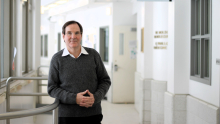Career of breakthroughs in neuroimaging recognized with one of the nation’s highest honours
A career that took an uncharted trajectory has been recognized with the Order of Canada, one of the country’s top honours.

A career that took an uncharted trajectory has been recognized with the Order of Canada, one of the country’s top honours.

Without clear and effective biological tests for autism based on genes, brain or blood measurements, diagnosis today still largely depends on clinical assessment. The standard way of doing this is by observing how the individual fits the criteria for autism listed in gold standard manuals like the Diagnostic and Statistical Manual of Mental Disorders, Fifth Edition (DSM-5).

A healthcare telementoring program housed at The Neuro and supported by the Transforming Autism Care Consortium (TACC) is expanding its reach after achieving designation as an ECHO Superhub. Under the direction of Julie Scorah, PhD, this milestone ensures that specialized knowledge reaches underserved communities.

Since becoming only the second Alzheimer’s-modifying drug to gain American FDA approval in 2023, sales of lecanemab, known by its brand name Leqembi, have risen steadily, reaching $87-million USD in the last quarter of 2024.

A project led by Ziv Gan-Or, MD, PhD, at The Neuro (Montreal Neurological Institute-Hospital) of McGill University and Martine Tétreault, PhD, at Université de Montréal has received more than $8 million to sequence the genomes of 8,700 people, to map the role of genetics in neurological disorders.

A new project co-led by Thomas Durcan, PhD, Director of The Neuro's Early Drug Discovery Unit, and overseen by Mathilde Chaineau, PhD, the EDDU’s program manager, will receive $400,000 in support from Génome Québec. In partnership with Nardin Nakhla and Armstrong Murira from the Montreal-based company Simmunome, Durcan and Chaineau will develop a computational model of amyotrophic lateral sclerosis (ALS) on which to test for new biomarkers and therapeutic targets.

Five clinicians and scientists at The Neuro have been awarded King Charles III Coronation Medals in recognition of their contributions to our understanding of neurological disease. The Coronation Medal commemorates the Coronation of His Majesty King Charles III as King of Canada. The medal is administered by the Chancellery of Honours at Rideau Hall.

Swelling caused by brain cancer is a problem that can lead to serious side effects and even death. While controlling swelling is important, a new study shows that a commonly prescribed anti-swelling drug suppresses the immune system for weeks after dosage, inhibiting the body’s ability to fight the cancer.



An innovative research project led by researchers at The Neuro has been awarded $1.5M by the Government of Quebec through CQDM.
YCharOS is an innovative platform led by neuroscientists Peter McPherson and Carl Laflamme that validates antibody reagents for human proteins.

REM sleep behaviour disorder (RBD) is an often debilitating condition that causes people to act out in their sleep, sometimes violently. What’s worse, people with the disorder often go on to develop Parkinson’s disease.

Gene therapy for rare neurological disorders will move one step forward thanks to a $1.14 million grant from the Canadian Institutes of Health Research (CIHR).

An innovative new program based at The Neuro has received $2.6 million from the CQDM and the Brain Canada Foundation.

Neuroplasticity is the brain’s ability to build connections within itself, adapting to the surrounding environment. The brain is most plastic in childhood, forming new pathways in reaction to stimuli such as language.